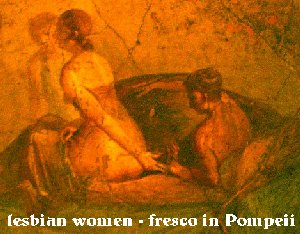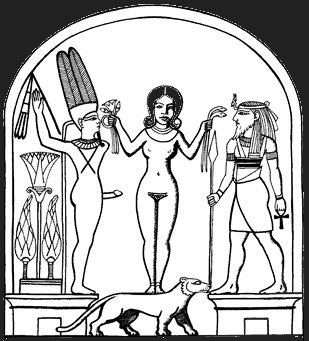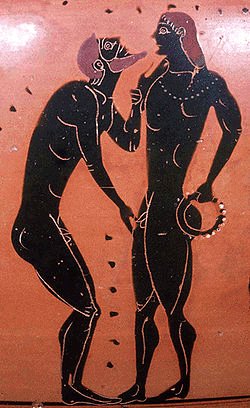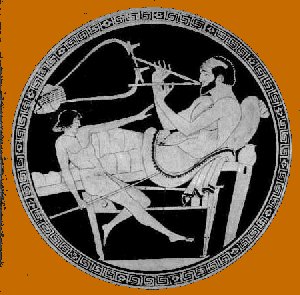Homosexuality
Case study on Romans 1,24-28
This document is part of an online course. If you want to study the rules of understanding Sacred Scripture methodically, join our course
Interpreting Scripture Correctly.
The course is free and offers distinct advantages. |
|
Paul found many aberrations in pagan society of his time. He writes:
"That is why God left them to their filthy enjoyments and the practices with which they dishonour their own bodies, since they have given up divine truth for a lie and have worshipped and served creatures instead of the creator who is blessed for ever. Amen.
 That is why God has abandoned them to degrading passions: their women have turned from natural intercourse to unnatural practices; their menfolk have given up natural intercourse to be consumed with passion for each other, men doing shameless things with men and getting an appropriate reward for their perversion. That is why God has abandoned them to degrading passions: their women have turned from natural intercourse to unnatural practices; their menfolk have given up natural intercourse to be consumed with passion for each other, men doing shameless things with men and getting an appropriate reward for their perversion.
In other words, since they refused to see it was rational to acknowledge God, God has left them to their own irrational ideas and to their monstrous behaviour." Romans 1,24 - 28
Did Paul, with these words, condemn all homosexual relationships?
|
First Observation
Paul's condemnation of homosexuality is part of a section in which he rejects the pagan world of his time as totally corrupt.
| |
Letter to the Romans chapter 1 |
|
| opening |
"The anger of God is revealed against all the depravity of people who keep truth imprisoned in their wickedndess . . ."
vs. 18 |
contrasts with the revelation of God's justice (= holiness) - 3,21 |
| the main sin |
The pagans have not wanted to acknowledge the one Creator of the world. vs. 19-23 |
as described in Wisdom 13,1-9, the creator can be known from creation |
| the punishment |
"That is why God left them to their filthy enjoyments and the practices with which they dishonour their own bodies, since they have given up divine truth for a lie and have worshipped and served creatures instead of the creator who is blessed for ever. Amen." vs. 24-25 |
The moral degradation of the pagan world is a consequence of not acknowledging God |
| the clearest example |
"That is why God has abandoned them to degrading passions: their women have turned from natural intercourse to unnatural practices; their menfolk have given up natural intercourse to be consumed with passion for each other, men doing shameless things with men and getting an appropriate reward for their perversion." vs. 26-27 |
for Paul homosexuality is the supreme example of pagan degradation |
| reason |
"In other words, since they refused to see it was rational to acknowledge God, God has left them to their own irrational ideas and to their monstrous behaviour." vs. 28 |
the degradation is again explained as a punishment |
| concluding climax |
"And so they are steeped in all sorts of depravity, rottenness, greed and malice, and addicted to envy, murder, wrangling, treachery and spite. Libellers, slanderers, enemies of God, rude, arrogant and boastful, enterprising in sin, rebellious to parents, without brains, honour love or pity. They know what God's verdict is: that those who behave like this deserve to die - and yet they do it; and what is worse, encourage others to do the same." vs. 29-32 |
Paul heaps up all sins, crimes, faults and excesses he can think of. |
Conclusion
In the opening part of his letter to the Romans Paul wants to establish that the whole world lies under the burden of sin: both the pagans (1,18-32) and the Jews (2,1 - 3,18). All people face God's judgement (3,19-20).
Paul does not directly discuss homosexuality. He highlights the homosexual practices of Hellenistic-Roman society of his time as an example of utter moral degradation.
|
Second Observation
Paul's strong wording in his denunciation of homosexuality are a form of 'hyperbole' often found in Sacred Scripture.
'Hyperbole' means 'rhetorical exaggeration'. It is a form of speaking or writing wellknown to the Jews. The speaker or writer exagerates to drive a point home as strongly as he can. Hyperboles should not be taken literally.
- "If your right eye should tempt you to sin, tear it out and throw it away; for it will do you less harm to lose one part of you than to have your whole body thrown into hell. And if your right hand should tempt you to sin, cut it off and throw it away; for it will do you less harm to lose one part of you than to have your whole body go to hell!" Matthew 5,29-30 - did Jesus want us to do this literally?
- "It was one of themselves, one of their own prophets who said: 'Cretans are always liars, evil beasts, lazy gluttons' This testimony is true!" Titus 1,12 - are all Cretans declared to be literally liars, beasts and gluttons - under inspiration?!
Conclusion
Paul calls all homosexuality 'degrading', 'unnatural', 'shameless' and 'a perversion'. The use of such language may not be seen as a dogmatic pronunciation. Paul wants to present the pagan world as corrupt and - in typical Jewish hyperbole style - expresses himself as forcefully as he can. |
Third Observation
In his judgement on homosexuality Paul was influenced by Old Testament passages that tried to protect the Jews from the sexual excesses of Canaanite worship and culture.
 |
| Anat was the Canaanite goddess of war and sex. She is here portrayed as standing on a lion between the Egyptian fertility god Min and the Canaanite war god Reshep. She offers to Min lotus flowers, symbol of sex, and to Reshep a pair of snakes. |
Examples of such excesses were:
- cult prostitution by men and women in which the sexual act with a representative of the goddess or god was thought to enhance fertility - Leviticus 19,29; Deuteronomy 23,17-18; 1 Kings 14,24; 2 Kings 23,7; etc.
- bestiality. "You must not lie with any animal. You would thereby become unclean. A woman must not offer herself to an animal, to have intercourse with it. This would be a foul thing." Leviticus 18,23; 20,15-16. The practice was, perhaps, linked to the cult to the sacred horses. 2 Kings 23,11.
- indiscriminate homosexuality. "You must not lie with a man as with a woman. This is a hateful thing." Leviticus 18,22 The indiscriminate nature of the practice is well demonstrated by the behaviour of the men of Sodom and Gomorrah: "The house was surrounded by the men of the town young and old, all the people without exception. Calling to Lot they said: 'Where are the men who came to you tonight? Send them out to us so that we can have sex with them!" Genesis 19,4-5
Conclusion
The Old Testament authors condemn indiscriminate homosexuality. They were not aware of the fact that some people are born as homosexuals.
Paul endorses the Old Testament condemnation because he too was unaware of what we know about sexuality today. |
Fourth Observation
 In Paul's time, the practice that disgusted Jews most was the widespread pederastia in the Greek-Roman world: especially older men sexually amusing themselves with younger boys. In Paul's time, the practice that disgusted Jews most was the widespread pederastia in the Greek-Roman world: especially older men sexually amusing themselves with younger boys.
The illlustration on the right from a Greek vase shows an older man with a beard making advances to an athletic young man. Below we see an older man amusing himself. He plays a musical instrument while teasing a young boy.

Conclusion
This behaviour was largely indiscriminate and often abusive of children.
Paul did not know the difference between such behaviour and serious gay or lesbian relationships as we know them today.
|
Overall Conclusion
Paul did not directly discuss homosexuality as such. He takes for granted that all homosexuality is wrong.
Paul's condemnation of the Greek-Roman excesses of his day was justified to the extent that indiscriminate homosexual practice, including the abuse of children for one's own sexual gratification, is an aberration.
However, Paul was unaware of what we know now: that homosexual trends are inborn in some people and therefore natural to them. Therefore he may not be invoked as condemning responsible homosexual relationships as we know them today.
© John Wijngaards |
|
Credits
The texts in our course Interpreting Scripture Correctly were written by John Wijngaards in 2009. Part of the contents is based on his earlier publications, in particular:
- Background to the Gospels (New Delhi 1970),
- God's Word to Israel (Ranchi 1971),
- Handbook to the Gospels (Ann Arbor 1980),
- Historicity in the Old Testament (Bangalore 1983)
- and Together in My Name (London 1991).
Illustrations in the video clip by Jackie Clackson. |
